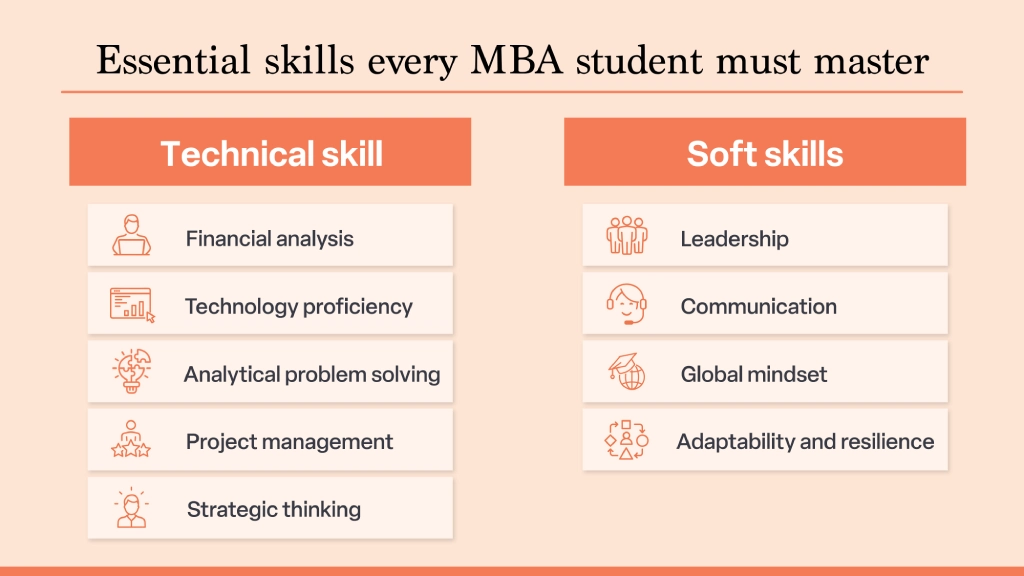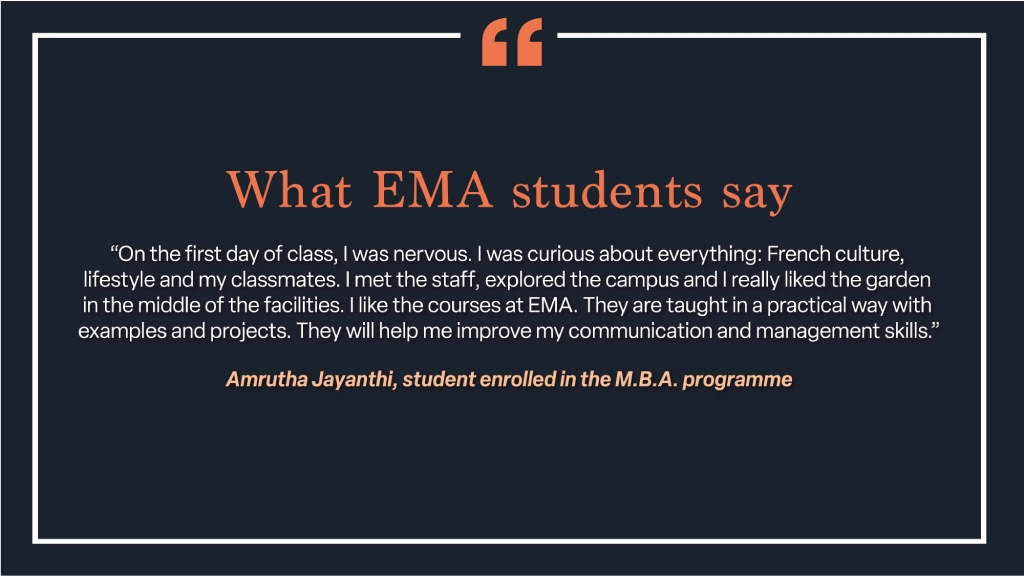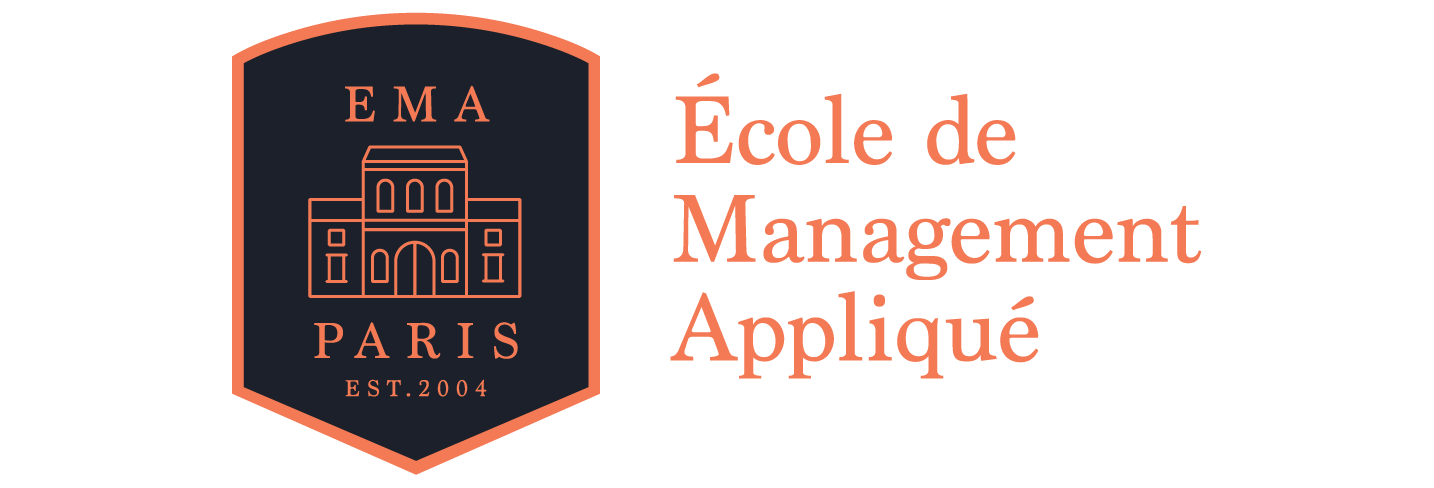Key soft skills include effective communication, emotional intelligence, adaptability, problem-solving, leadership, teamwork and time management. Studying MBA abroad not only helps students build these skills through collaborative projects and diverse cultural interactions but also prepares them to face global business challenges with confidence and creativity.
An MBA from France is often considered a significant step for career growth. Employers highly value MBA graduates for their strong strategic thinking and leadership skills. An MBA opens various career opportunities, including roles as top-level managers, consultants, entrepreneurs or professionals in international organisations. It also gives graduates a competitive edge, helping them to stand out in a challenging job market.
An MBA is more than just a degree; it is a gateway to developing MBA skills that offer a distinct competitive advantage. These skills, gained through rigorous academic study and practical application, prepare graduates to excel in leadership roles and drive organisational success. This blog discusses leadership skills and other core competencies that make MBA graduates highly sought after by employers worldwide.

Key MBA skills every student needs to succeed in the business world
Core competencies are the unique blend of skills, knowledge and technologies that give organisations their competitive edge. These range from strategic thinking and financial analysis to leadership, innovation and digital transformation.

The MBA programmes in Paris are designed to impart these competencies through theoretical learning and practical experiences. Hense preparing future leaders for real-world business situations
Financial analysis
Financial analysis is the bedrock of sound decision-making, enabling managers to understand the financial implications of their choices.
- Financial statement analysis: Understanding and interpreting balance sheets, income statements and cash flows to assess financial performance.
- Investment analysis: It is one of the crucial MBA skills to evaluate investment opportunities and make informed capital allocation decisions.
- Budgeting and forecasting: Developing budgets and financial forecasts to guide resource allocation and performance management.
Professionals can develop strong financial analysis skills through an MBA in Paris, allowing them to drive profitability and growth in diverse business environments.
Innovation and technology
Innovation and technology are essential MBA skills for organisations to stay ahead of the curve in a rapidly changing business environment.
- Technology adoption: Assessing and implementing new technologies to improve efficiency and effectiveness.
- Creative problem-solving: Thinking outside the box to develop innovative solutions to business challenges.
- Digital transformation: Leading organisational efforts to embrace digital technologies and transform business processes.
By integrating innovation and technology into their MBA leadership journey, professionals can lead future-ready organisations that thrive in the digital age.
Analytical problem-solving
Analytical problem-solving involves breaking down complex problems into manageable components and developing data-driven solutions.
- Data analysis: Using statistical tools and techniques to analyse data and identify patterns.
- Critical thinking: Evaluating information and arguments objectively to make informed decisions.
- Decision-making: Making timely and effective decisions based on available information and analysis.
Strengthening analytical problem-solving through an MBA in France equips future leaders to make smarter choices and drive impactful business outcomes.
Project management
Strong project management skills are essential for delivering successful outcomes on time and within budget. These skills ensure resources are used efficiently and goals are met effectively. Key aspects include:
- Planning and execution: Developing project plans and executing them effectively to achieve the project goals.
- Risk management: Identifying and mitigating project risks to minimise disruptions.
- Team coordination: It is one of the soft MBA skills that students must develop and coordinate project team efforts to ensure project success.
Mastering these project management skills helps individuals lead with confidence and drive consistent results.
Strategic thinking
Strategic thinking involves more than just planning; it is about envisioning the future and charting a course to get there.
- Long-term vision: The ability to anticipate market trends and develop strategies that position the organisation for sustained success.
- Competitive analysis: Evaluating competitors' strengths and weaknesses to identify opportunities and threats.
- Resource allocation: Making informed decisions about how to allocate resources to achieve strategic goals.
By sharpening strategic thinking skills, professionals can lead with purpose, adapt to change and create lasting impact within their organisations.
Leadership and ethics
Strengthening MBA leadership skills with a focus on ethics empowers professionals to lead with confidence, earn respect and drive meaningful impact within their organisations.
- Team management: Motivating and guiding teams to achieve common goals.
- Ethical decision-making: Making decisions that align with ethical principles and organisational values.
- Communication: Effectively communicating with stakeholders to build trust and foster collaboration.
Communication and interpersonal skills
It is imperative for MBA graduates to convey their message clearly and confidently to various stakeholders. Communication skills developed through the MBA programme in Paris can enhance a student’s ability to collaborate effectively, lead diverse teams and influence decision-making at various organisational levels.
- Verbal and written communication: Articulating ideas clearly and persuasively in both verbal and written formats.
- Active listening: Paying attention to and understanding others’ perspectives.
- Negotiation: Reaching mutually beneficial agreements through effective negotiation strategies.
At École de Management Appliqué (EMA), students are given numerous opportunities to strengthen their communication and interpersonal skills through case studies, group projects, presentations and real-world business simulations. EMA’s multicultural learning environment and emphasis on practical experience ensure that graduates are well-prepared to engage with global audiences and succeed in international business settings.
Global mindset
It helps professionals navigate international markets, build diverse teams and respond effectively to global challenges. Key aspects of a global mindset include:
- Cultural sensitivity: Understanding and respecting cultural differences in a global business environment.
- Cross-cultural communication: Adapting communication styles to effectively interact with individuals from different cultures.
- Global awareness: Staying informed about global events and trends that may impact business operations.
By embracing these qualities, professionals can thrive in diverse work environments and contribute to the success of globally focused organisations. EMA indulges in conducting networking events which provide its students with exposure and awareness of the environment. These events connect students with industry leaders, alumni and peers, helping them build meaningful relationships and stay informed about current market trends.
Adaptability and resilience
Adaptability and resilience are vital for personal and professional growth. These qualities help individuals stay effective and motivated through uncertainty and change. Key elements include:
- Flexibility: Adjusting to changing circumstances and adapting to new challenges.
- Resilience: Bouncing back from setbacks and maintaining a positive attitude in the face of adversity.
- Change management: Leading organisational change initiatives and helping employees adapt to new ways of working.
Cultivating adaptability and resilience enables professionals to navigate challenges confidently and support innovation and progress within their organisations.
Practical learning approach to an MBA in France

MBA in France emphasises experiential learning through case studies, simulations and live projects. These initiatives provide hands-on experience, allowing students to analyse business issues, cultivate decision-making abilities and network with industry leaders.
At École de Management Appliqué (EMA), the programme stands out with its personalised learning approach through small class sizes, lifetime career support and flexible intake options (three intakes per year).
These unique features ensure that students receive tailored guidance, career development opportunities and the flexibility to align their education with their personal and professional goals.
Pathway to MBA skill development
As technology reshapes the business environment, MBA programmes incorporate emerging fields such as Artificial Intelligence, Big Data Analytics and Cybersecurity. This ensures that graduates are equipped to lead in an ever-changing world.
The skills developed in MBA programmes directly impact profitability and competitive advantage. Analytical skills aid in identifying market trends, leadership abilities enhance team management and financial acumen optimises resource allocation.

If you are considering an MBA, explore options like an MBA in Paris to gain a global perspective. You should think about studying for an MBA abroad to broaden your horizons and enhance your career prospects.
FAQs regarding developing MBA skills
Q. What are the seven soft skills for students?
Q. Is studying for an MBA in France worth it?
Studying an MBA in France can be a valuable investment, especially for those aiming for high-quality education, career growth and access to a strong professional network. France is home to some of the best business schools, such as École de Management Appliqué, Paris, which is renowned for its global reputation and rigorous academic programmes.
Q. What are the eligibility requirements for an MBA in France at École de Management Appliqué (EMA)?
To apply for the MBA programme at École de Management Appliqué (EMA), applicants must submit certificates and transcripts for all previous academic achievements. They must possess an undergraduate degree (BAC +3 or equivalent). Additionally, all applicants are required to meet English language requirements by submitting a recognised test score (e.g. IELTS, TOEFL, PTE, or Duolingo), which can be verified through official online tools.
Q. How can I get the best job after completing an MBA abroad?
To get the best job after studying an MBA abroad, focus on building a strong professional network, gaining relevant internship experience, tailoring your CV for international roles and making full use of your business school’s career services. Highlight your global exposure, leadership skills and problem-solving abilities during job interviews.
Q. Does EMA provide student support services after completing the MBA programme?
Yes, EMA provides dedicated student support services even after the completion of the MBA programme. The support team assists graduates with resume building, mock interviews and career guidance to help them confidently step into the job market. EMA is committed to lifelong career support, ensuring that students continue to benefit from its resources and network well beyond graduation.

 Brochure
Brochure
 Apply Now
Apply Now